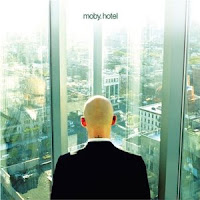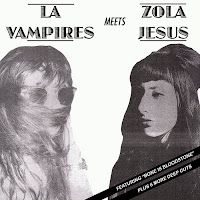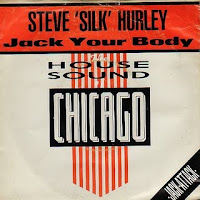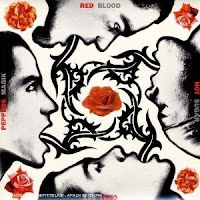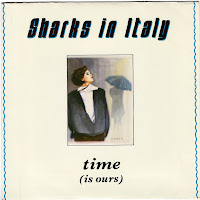
SixtyFiveMiles released a new EP on the Cherry Red label last week. I loved their Finnish Tango album and have quietly become a fan of their mature indie pop sound (it's evidently not hard to be a fan when they only have two releases so far on iTunes). 'Mary' is a smart, radio-friendly dispatch with a neat American sound – not a bad trick from a band from the Midlands. The rest of the songs on the EP are good as well, but it's 'Mary' that steals the show here. Ideal uplifting stuff for grey, cold January days. Finnish Tango was an accomplished debut; on the strength of the Mary EP, we can expect yet greater things from album number two.
I've had Monaco's Music For Pleasure on cassette since it was released in 1997. For the life of me I don't know why I was buying anything on cassette back then, but for some reason I did. I think I bought it from John Menzies on Colchester High Street. I mean, how uncool is that? A cassette bought from a crap generalist retailer?

New Order called it quits acrimoniously after the release of 1993's Republic. Themes of disenchantment and disappointment riddled that album, most notably on the delicate 'Ruined In A Day', a bitter song directed squarely at the late Manchester music impresario Tony Wilson, who sold the Factory Records dream – and with it New Order's independence – to the big, evil London Records. New Order promptly split up and went off in different directions – Bernard Sumner hooked up with Johnny Marr and ex-Kraftwerk robot Karl Bartos for a second Electronic album, Peter Hook recorded two Monaco albums and the other two – Gillian Gilbert and Stephen Morris – became The Other Two.
The pleasant thing for any New Order fan was that it didn't matter which spin-off you followed, they still sounded like New Order. Music For Pleasure is a case in point. Songs like the first single 'What Do You Want From Me?' – where vocalist David Potts, from Hooky's first side project, Revenge, delivers his very best pastiche of Bernard Sumner – could have appeared on a New Order album proper, and of course Hooky's bass melodies ensure that the references are constant. As a stop-gap between Republic and New Order's unexpected 2001 reformation for Get Ready, Music For Pleasure works fine; it has a bunch of good songs like the disco-y 'Sweet Lips' (definitely from the early Mike Pickering / M People school of Manchester dance music) or the dance-epic 'Junk', but on other tracks the duo seem to lean into the whole Oasis side of Manchester music which I've never appreciated.
I want to learn yoga. I made this decision some time ago and like most things fitness-related, I haven't done a thing about it. Mrs S does yoga; Daughters #1 and #2 have a book called Itsy Bitsy Yoga (it's for kids) which they enjoy from time to time. The reasons for wanting to learn are thus: first, it's healthy, but that's a boring reason; second, and the reason for mentioning it here, is because Lou Reed is an ardent yoga enthusiast. Or maybe it's Tai Chi – either way, I think if the cantankerous curmudgeon can find solace through meditative stretching, there's hope for me yet.

In 2007, Reed released an album principally designed for his own use while running through his Tai Chi routine. For a man who once sang about the euphoric rush of speed and heroin, that may sound incomprehensibly mild, but suspend any thoughts of incongruity and Hudson River Wind Meditations is quite a beautiful album. Designed to evoke the sound of the breeze along the Hudson outside Reed's Manhattan home, the album is fundamentally intended to be connected to nature; without knowledge of that inspiration it would simply be a really good ambient album, as good as any similar sound work by Brian Eno. (Eno, incidentally, during the David Byrne film Ride, Rise, Roar that I saw last week, said that he felt listeners created too many inadvertent impressions of the 'messages' of songs because of titles and words – the listener's approach to Reed's album is here almost totally informed by the purpose of the music and the title, without even listening to it.)
I happen to think it's a brilliant, if slightly unexpected, inclusion in the Reed back catalogue. I'll place it alongside Stephen Vitiello's recordings from the top of the World Trade Center, which, along with sirens and other city sounds from far, far below, also captured the actual environmental sound of the Hudson air currents buffeting the buildings; which isn't that serene when you think about it.
I've had Monaco's Music For Pleasure on cassette since it was released in 1997. For the life of me I don't know why I was buying anything on cassette back then, but for some reason I did. I think I bought it from John Menzies on Colchester High Street. I mean, how uncool is that? A cassette bought from a crap generalist retailer?

New Order called it quits acrimoniously after the release of 1993's Republic. Themes of disenchantment and disappointment riddled that album, most notably on the delicate 'Ruined In A Day', a bitter song directed squarely at the late Manchester music impresario Tony Wilson, who sold the Factory Records dream – and with it New Order's independence – to the big, evil London Records. New Order promptly split up and went off in different directions – Bernard Sumner hooked up with Johnny Marr and ex-Kraftwerk robot Karl Bartos for a second Electronic album, Peter Hook recorded two Monaco albums and the other two – Gillian Gilbert and Stephen Morris – became The Other Two.
The pleasant thing for any New Order fan was that it didn't matter which spin-off you followed, they still sounded like New Order. Music For Pleasure is a case in point. Songs like the first single 'What Do You Want From Me?' – where vocalist David Potts, from Hooky's first side project, Revenge, delivers his very best pastiche of Bernard Sumner – could have appeared on a New Order album proper, and of course Hooky's bass melodies ensure that the references are constant. As a stop-gap between Republic and New Order's unexpected 2001 reformation for Get Ready, Music For Pleasure works fine; it has a bunch of good songs like the disco-y 'Sweet Lips' (definitely from the early Mike Pickering / M People school of Manchester dance music) or the dance-epic 'Junk', but on other tracks the duo seem to lean into the whole Oasis side of Manchester music which I've never appreciated.
I want to learn yoga. I made this decision some time ago and like most things fitness-related, I haven't done a thing about it. Mrs S does yoga; Daughters #1 and #2 have a book called Itsy Bitsy Yoga (it's for kids) which they enjoy from time to time. The reasons for wanting to learn are thus: first, it's healthy, but that's a boring reason; second, and the reason for mentioning it here, is because Lou Reed is an ardent yoga enthusiast. Or maybe it's Tai Chi – either way, I think if the cantankerous curmudgeon can find solace through meditative stretching, there's hope for me yet.

In 2007, Reed released an album principally designed for his own use while running through his Tai Chi routine. For a man who once sang about the euphoric rush of speed and heroin, that may sound incomprehensibly mild, but suspend any thoughts of incongruity and Hudson River Wind Meditations is quite a beautiful album. Designed to evoke the sound of the breeze along the Hudson outside Reed's Manhattan home, the album is fundamentally intended to be connected to nature; without knowledge of that inspiration it would simply be a really good ambient album, as good as any similar sound work by Brian Eno. (Eno, incidentally, during the David Byrne film Ride, Rise, Roar that I saw last week, said that he felt listeners created too many inadvertent impressions of the 'messages' of songs because of titles and words – the listener's approach to Reed's album is here almost totally informed by the purpose of the music and the title, without even listening to it.)
I happen to think it's a brilliant, if slightly unexpected, inclusion in the Reed back catalogue. I'll place it alongside Stephen Vitiello's recordings from the top of the World Trade Center, which, along with sirens and other city sounds from far, far below, also captured the actual environmental sound of the Hudson air currents buffeting the buildings; which isn't that serene when you think about it.



